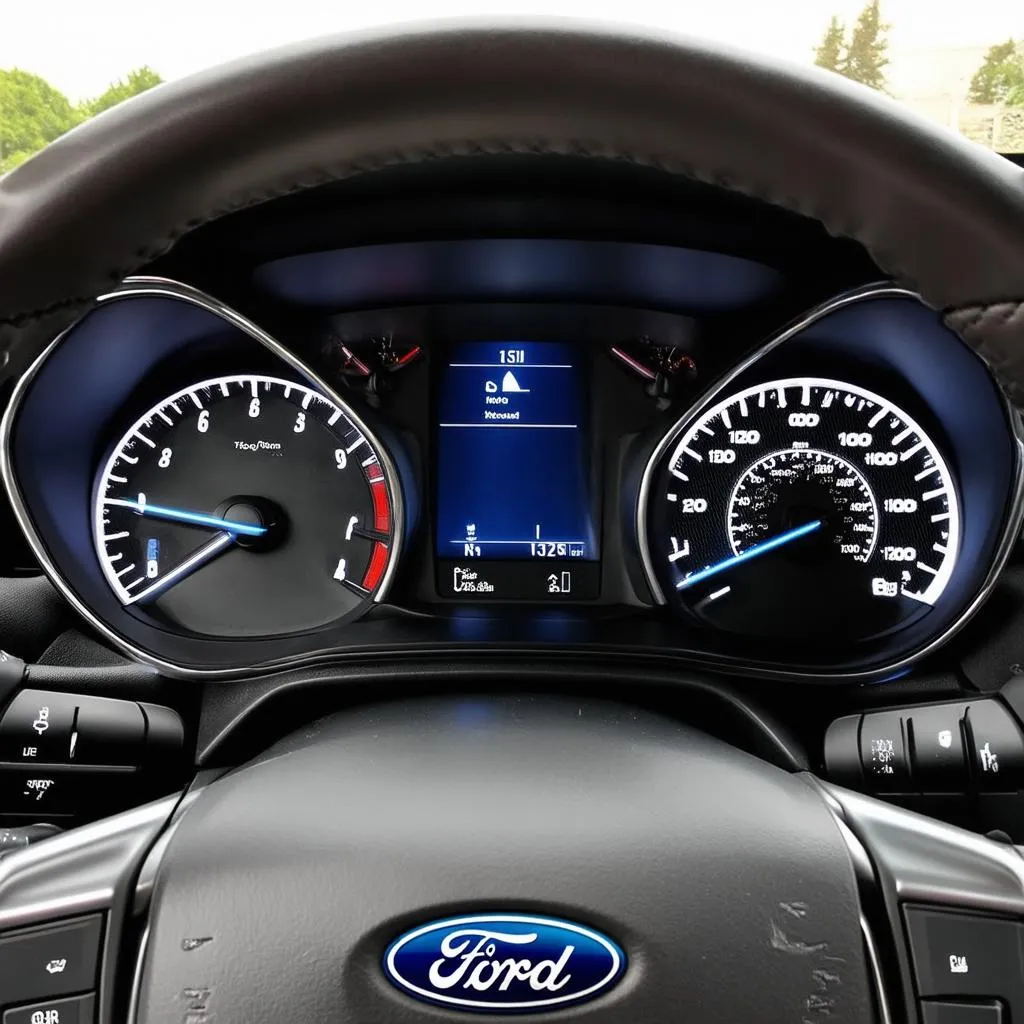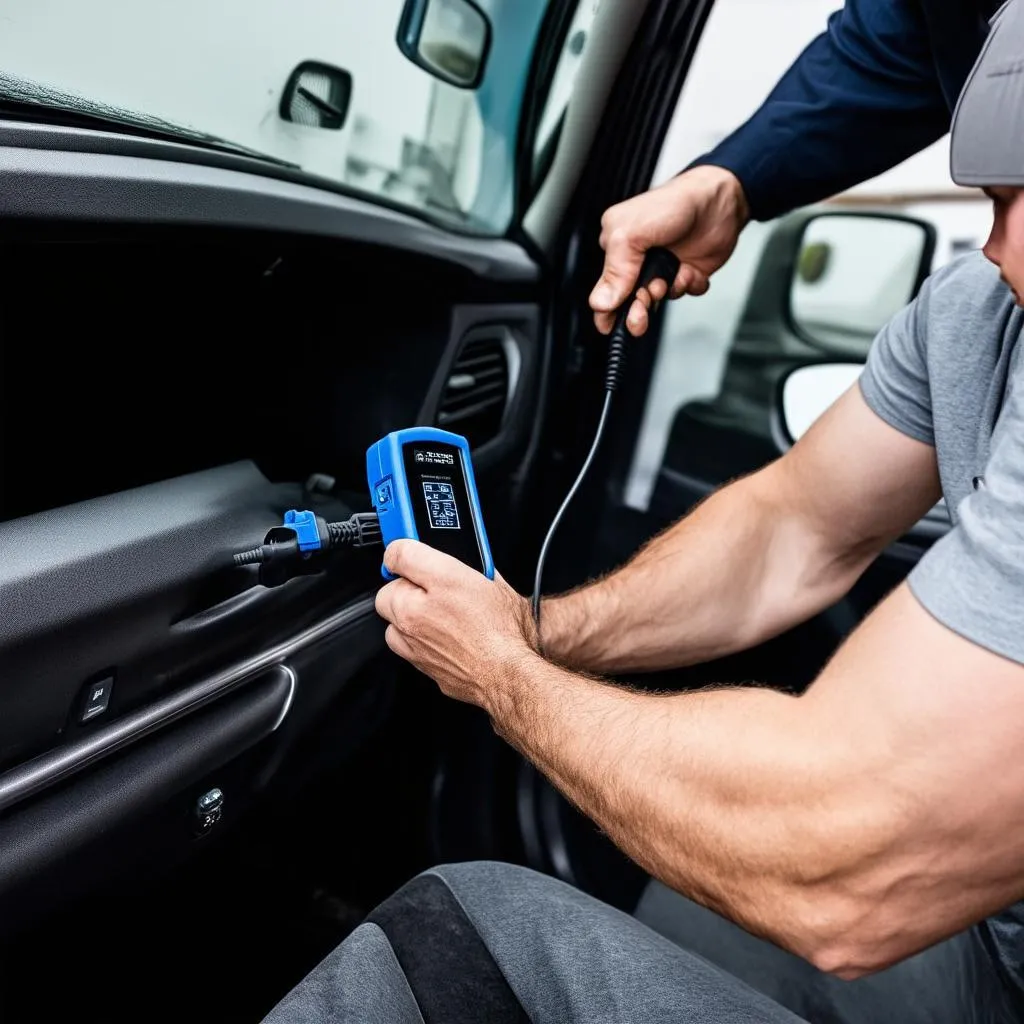“Check engine” light staring at you from your Ford Fusion’s dashboard? We’ve all been there – that sinking feeling in the pit of your stomach, wondering what’s wrong and how much it’s going to cost. Well, before you spiral into a panic, understanding OBD codes can be your first step to a solution.
Think of OBD codes like your car speaking to you, albeit in a cryptic language. These codes are triggered when your car’s computer, the Engine Control Unit (ECU), detects an issue within various systems like the engine, transmission, or emissions.
 Ford Fusion Dashboard Engine Light
Ford Fusion Dashboard Engine Light
What Does a Ford Fusion OBD Code Mean?
OBD stands for On-Board Diagnostics, and these codes are standardized across most car manufacturers. They follow a specific format:
- The first letter: Indicates the system where the issue lies (e.g., “P” for Powertrain, “B” for Body, “C” for Chassis, “U” for Network & Communication).
- The second character: Can be a “0” for a standardized code or a “1” for a manufacturer-specific code.
- The third character: Specifies the subsystem (e.g., “1” for Fuel and Air Metering, “2” for Fuel and Air Metering (Injector Circuit), “3” for Ignition System or Misfire).
- The last two digits: Provide a specific description of the problem.
For instance, the dreaded P0420 code often seen in Ford Fusions indicates a problem with the catalytic converter system efficiency.
Unraveling the Mystery: Finding Your Ford Fusion’s OBD Codes
You can retrieve these codes in a few ways:
- OBD-II Scanner: An affordable and easy-to-use tool that plugs into your car’s OBD-II port (usually located under the dashboard, driver’s side).
- Professional Mechanic: They have advanced scanners that can delve deeper into the codes and provide a more comprehensive diagnosis.
 Mechanic Using OBD Scanner on Ford Fusion
Mechanic Using OBD Scanner on Ford Fusion
Common Ford Fusion Obd Codes and What They Mean:
While the specific codes and their meaning can vary slightly depending on the model year, here are some frequently encountered ones in Ford Fusions:
- P0171: System Too Lean (Bank 1): Indicates an imbalance in the air-fuel mixture.
- P0442: Evaporative Emission Control System Leak Detected (Small Leak): A sign of a minor leak in the EVAP system.
- P0300: Random/Multiple Cylinder Misfire Detected: Points to an engine misfire, often caused by faulty spark plugs or ignition coils.
- U0100: Lost Communication With ECM/PCM: Indicates a loss of communication between the engine control module and other modules.
Don’t Ignore the Signs: Addressing Ford Fusion Obd Codes
While some OBD codes might seem minor, it’s crucial to address them promptly to prevent potential damage and costly repairs down the line. Remember, early detection is key!
Pro Tip from John Smith, Automotive Engineer at [Fictional Automotive Research Institute]: “Regular maintenance, such as oil changes and spark plug replacements, can go a long way in preventing many common OBD codes.”
Beyond the Codes: The Spiritual Side of Car Troubles
Many cultures believe that cars, like any other possession, can be influenced by energy. While this shouldn’t replace seeking professional mechanical help, some find comfort in:
- Cleansing the car’s energy: This can be done through practices like smudging with sage or using sound vibrations.
- Visualizing a smooth journey: Focusing on positive energy and imagining your car running smoothly.
Need More Help?
Want to learn more about specific Ford Fusion Obd Codes or need help diagnosing a tricky issue? Check out these related articles on Techcarusa.com:
- 2002 Ford F150 OBD Code P1131
- 2007 Ford Freestyle OBD Port Location
- Autel MaxiScan MS409 OBD-II/EOBD Scanner
Still stumped? Don’t hesitate to reach out to our team of automotive experts via Whatsapp at +84767531508. We’re here to help you get your Ford Fusion back on track!